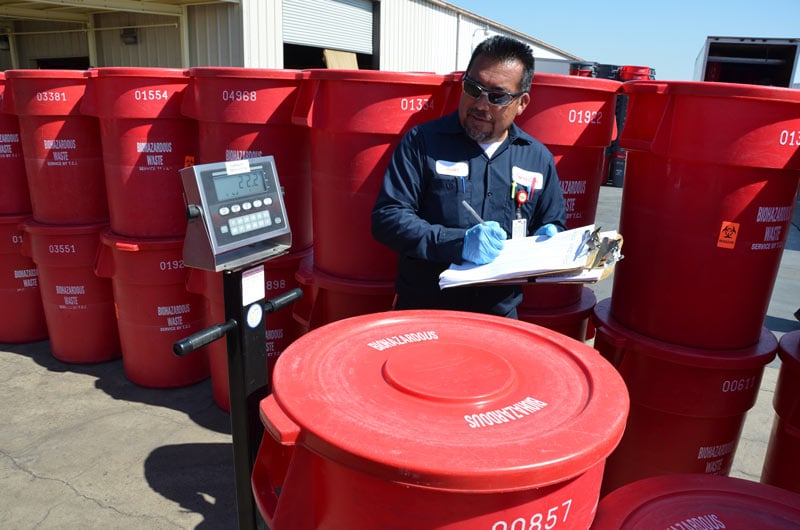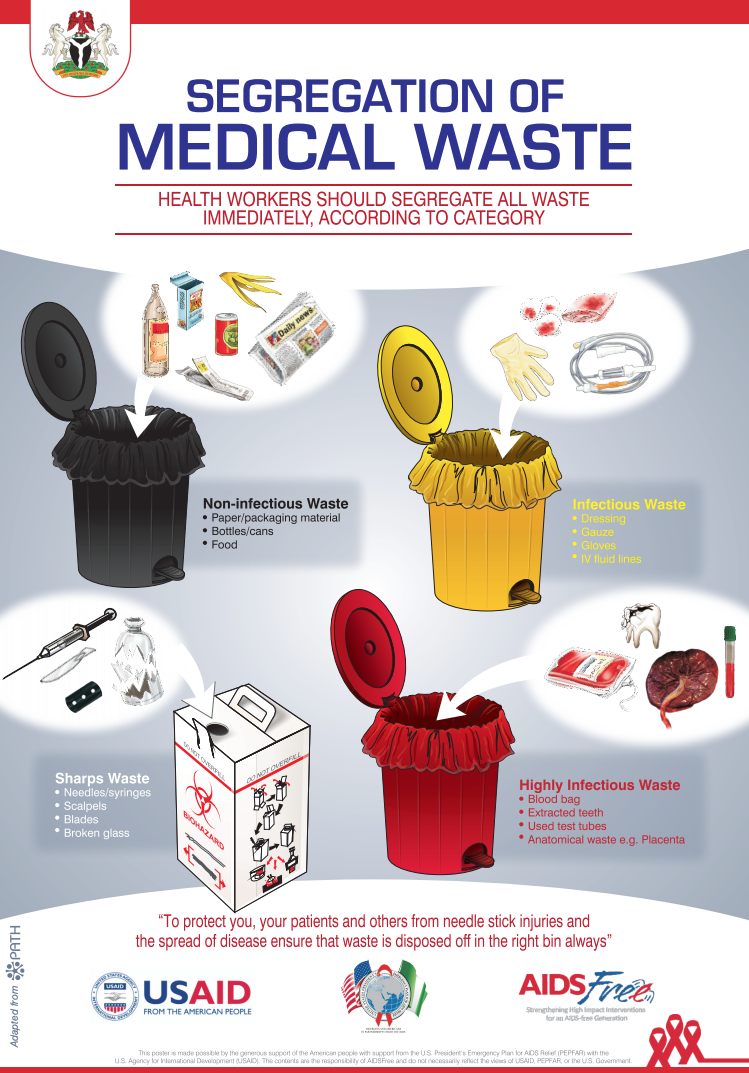Safe and Efficient Medical Waste Removal: Your Trusted Environmental Companion
Making Sure Safe Handling and Disposal of Medical Waste
Making sure risk-free handling and disposal of medical waste is of extremely important importance in health care setups. Inappropriate administration of clinical waste can pose substantial risks to the atmosphere, public health and wellness, and health care employees. In this intro, we will certainly check out the value of proper medical waste management, the dangers connected with incorrect handling and disposal, as well as the standards and strategies that can be implemented to guarantee its risk-free disposal.
Significance of Appropriate Clinical Waste Monitoring
Appropriate medical waste management is of utmost importance in ensuring the security and wellness of health care specialists, patients, and the public. Medical waste describes any type of waste produced by health care centers during the medical diagnosis, treatment, or immunization of human beings or animals. This waste can posture major health and wellness risks otherwise taken care of and taken care of appropriately.
Among the primary reasons that correct medical waste monitoring is critical is to prevent the spread of infectious illness. Clinical waste, such as utilized needles, infected dressings, and organic products, can lug unsafe virus. Otherwise managed and thrown away appropriately, these virus can be transmitted to health care employees, patients, waste handlers, and also the public, bring about the possible break out of illness.
Furthermore, correct medical waste management aids safeguard the environment - medical waste removal. Clinical waste includes harmful materials, consisting of chemicals, drugs, and contaminated substances. When not managed appropriately, these materials can infect dirt, water bodies, and the air, positioning a significant threat to environments and public health
In addition, reliable medical waste monitoring makes sure compliance with international criteria and local regulations. Federal governments and governing bodies have established protocols and standards to guarantee the risk-free handling, storage, transport, and disposal of medical waste. Following these regulations is necessary to stay clear of legal consequences and preserve the track record and credibility of healthcare centers.
Threats of Improper Handling and Disposal

Patients can additionally be subjected to these infectious diseases if medical waste is not effectively disposed of. If contaminated needles or other sharps are not disposed of in assigned puncture-proof containers, they may unintentionally prick people, leading to possible infections. Additionally, if medical waste is not segregated appropriately, there is a danger of cross-contamination between different kinds of waste, further increasing the opportunities of condition transmission.
Incorrect disposal of medical waste can also have harmful effects on the atmosphere and the basic public. If clinical waste is not treated and gotten rid of correctly, it can contaminate water sources, dirt, and air, bring about the spread of diseases and pollutants. This can have lasting consequences on ecosystems and public health and wellness.
Standards for Safe Handling of Medical Waste
Applying effective protocols for the secure handling of clinical waste is necessary in making certain the defense of health care specialists, clients, and the public. These guidelines are crucial in lessening the threats connected with the handling and disposal of clinical waste, such as infections, injuries, and environmental contamination.
Firstly, health care facilities have to develop a detailed waste administration strategy that follows regional, national, and worldwide guidelines. This strategy should consist of clear instructions on waste segregation, packaging, transport, labeling, and storage. It is crucial to divide different kinds of waste, such as sharps, transmittable products, drugs, and non-hazardous waste, to stop cross-contamination and promote secure disposal.
Furthermore, medical care employees should receive comprehensive training on proper waste handling strategies. They need to be educated on the potential risks of medical waste, the suitable use personal safety devices (PPE), and the appropriate treatments for dealing with, transporting, and disposing of different kinds of waste.
Furthermore, healthcare facilities must regularly keep track of and examine their waste monitoring methods to ensure conformity with standards. This consists of performing regular assessments, assessing waste handling procedures, and offering feedback and training to personnel.
Efficient Techniques for Garbage Disposal
To ensure the safe handling and disposal of medical waste, it is necessary to utilize effective techniques for waste disposal. Medical waste can present substantial threats to public health and wellness and the environment if not managed and disposed of correctly. As a result, healthcare centers and waste management companies have to implement ideal techniques to mitigate these risks.
It entails separating different types of clinical waste based on their characteristics. Health care facilities ought to offer clear guidelines and training to personnel participants on exactly how to set apart waste appropriately.

Moreover, medical care centers need to collaborate with qualified waste management firms to ensure proper disposal of medical waste. These firms have the experience and devices required to securely deal with and dispose of clinical waste in compliance with policies and finest techniques.
Training and Education And Learning for Healthcare Professionals
Health care professionals play a vital role in making sure the safe handling and disposal of medical waste through thorough training and education. It is crucial for doctor to have a deep understanding of the potential threats connected with medical waste and the proper protocols for its management. By obtaining proper training, health care specialists can reduce the potential transmission of transmittable conditions, avoid environmental contamination, and secure both themselves and the general public.

Furthermore, training programs ought to emphasize making use of personal safety devices (PPE) and correct hand hygiene techniques when dealing with clinical waste. medical waste disposal. Healthcare professionals should know just how to correctly make use of and get rid of of PPE to safeguard themselves from possible direct exposure to dangerous materials. They should likewise be enlightened on the value of normal handwashing and the proper use hand sanitizers to minimize the spread of contagious conditions
Continuing education and learning and normal updates on medical waste monitoring techniques are crucial for healthcare experts. As guidelines and policies progress, it is important to keep healthcare carriers informed concerning any type of adjustments in protocols and best techniques. This will certainly guarantee that they remain up-to-date and keep a high standard of safety in dealing with and getting rid of of medical waste.
Conclusion
In verdict, appropriate handling and disposal of medical waste is important to ensure the safety and security of health care specialists, clients, and the atmosphere. Overlooking to comply with policies and standards can lead to different threats and risks. Applying effective approaches for garbage disposal and providing proper training and education for health care professionals are crucial in maintaining a risk-free medical care atmosphere. By sticking to these methods, we can reduce the possible risks connected with medical waste.
Clinical waste refers to any type of waste produced by health care facilities throughout the diagnosis, treatment, or booster shot of human beings or pets. If clinical waste is not set apart appropriately, there is a risk of cross-contamination in between various kinds of waste, additional enhancing the opportunities of condition transmission.
It is vital to separate different kinds of waste, such as sharps, infectious materials, pharmaceuticals, and non-hazardous waste, to avoid cross-contamination and advertise risk-free disposal. WasteX Medical Waste Disposal.
To ensure the secure handling and disposal of clinical waste, it is important to employ effective strategies for waste disposal. In addition, medical care facilities need to develop a normal waste collection and transport routine to prevent waste accumulation and reduce the threat of discover this crashes or contamination.